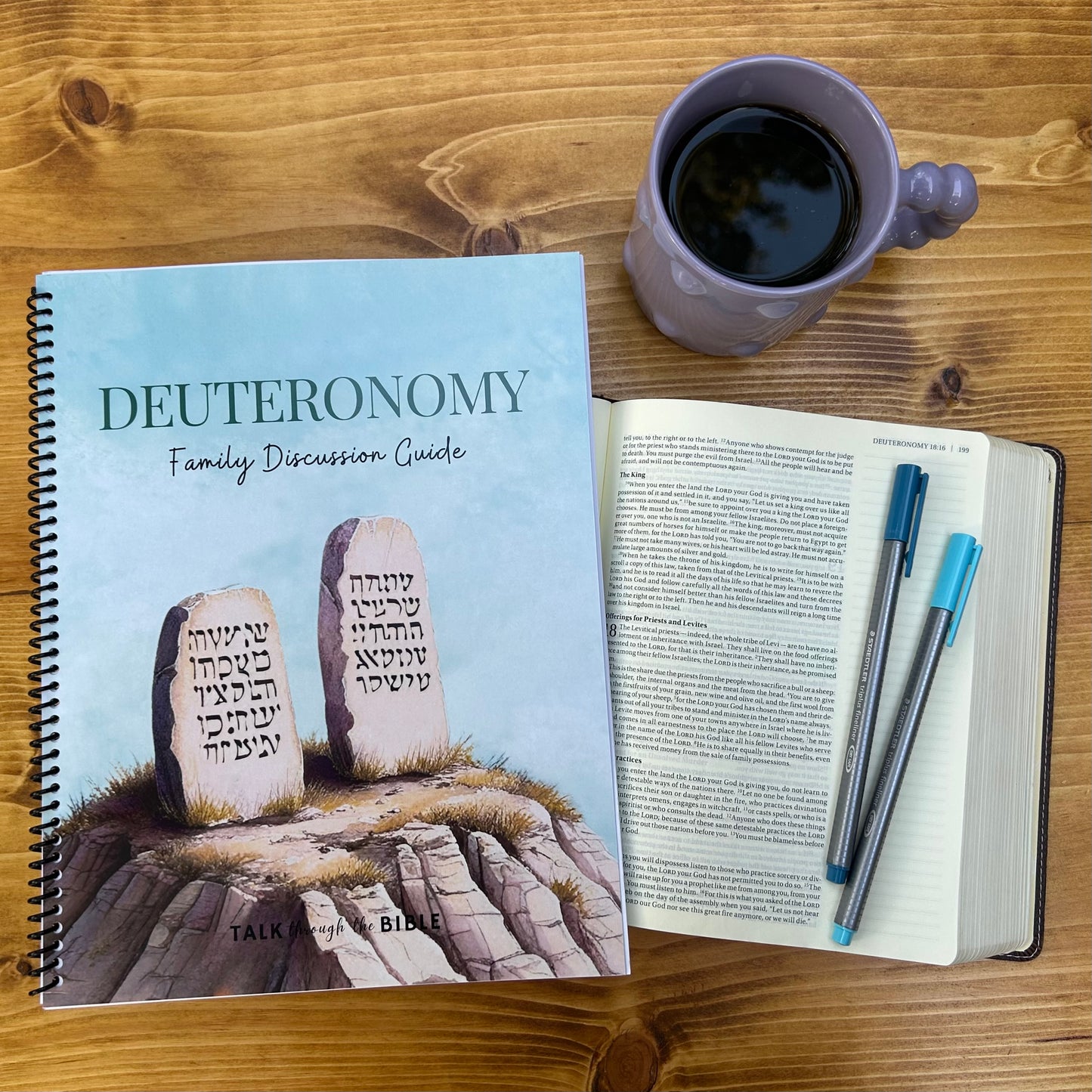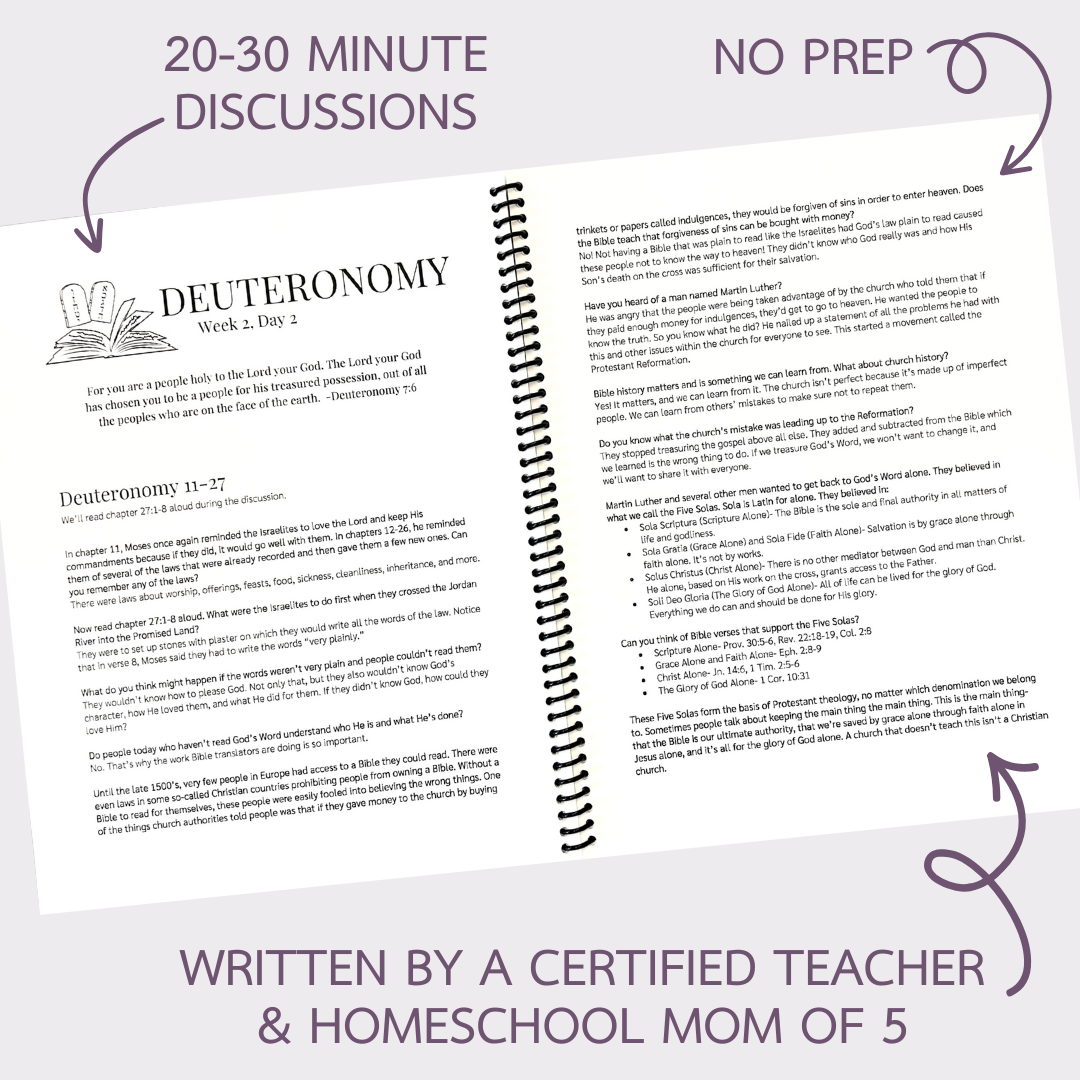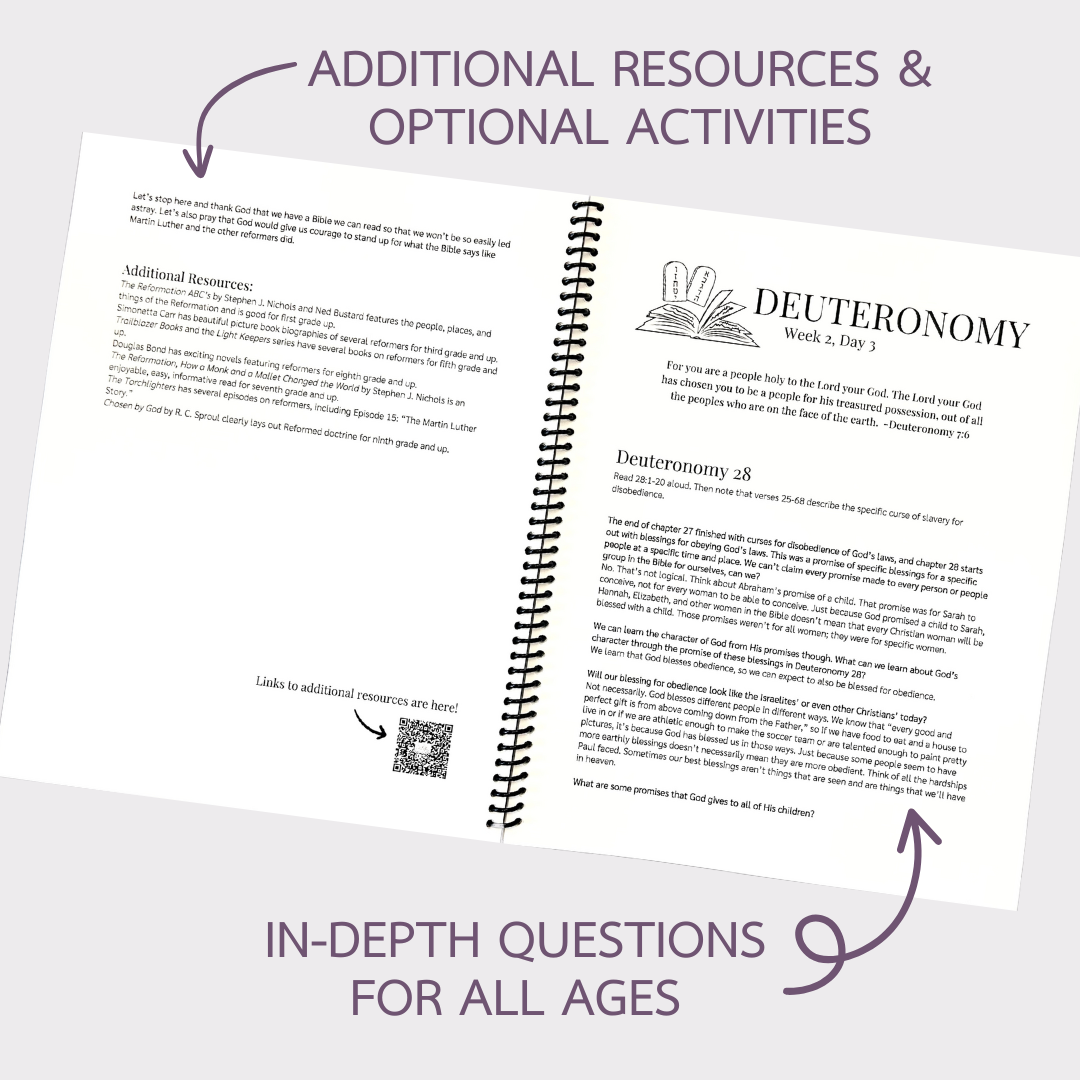Deuteronomy Bible Study Discussion Guide
Deuteronomy Bible Study Discussion Guide
Couldn't load pickup availability
An open-and-go family Bible study of discussions through Deuteronomy
- 3 weeks of in-depth lessons
- 20-30 minute discussions
- Focus on ages 7-16
- No prep
- Optional resources & activities
- Perfect for homeschool or family devotions
Just open up, read the Bible chapter, and start asking the leading questions designed to help your kids think through tough questions they may already be pondering in their hearts or will one day be asked by the world. Numerous Scripture references help kids understand Deuteronomy in the context of God's character and plan.
The questions and answers in our curriculum can be used as a script or as a starting point for your own conversations and can go as deep as your kids are ready for.

Some big things you'll discuss:
- The hardening of hearts
- Adding and subtracting from God's Word
- Testing the Lord and questioning His faithfulness
- Fear of the Lord
- Our identity as believers
- The Reformation and Five Solas
- Good works God has planned for His children
- Why the Old Testament is important
This discussion guide will help you:
- Reveal God's character
- Teach solid Christian doctrine
- Encourage critical thinking skills
- Present the Bible as one big story
- Teach children to make connections in the Bible rather than reading passages as individual and isolated from the rest of Scripture
- Demonstrate how the Old Testament points to Jesus and the New Testament
- Show that human nature hasn't changed; we can relate to those before us, and all of us need Christ
- Discover how through the Holy Spirit, all Scripture can penetrate our hearts, teach us, convict us, and change us

Why make time for a discussion-based study rather than giving your kids a simple question-and-answer study book or devotional?
- Your faith is the most important thing to you. Through family discussions, your kids will see how much you love the Word, and they'll begin to love studying Scripture too.
- Through discussions, you can guide your children into what you believe the Bible teaches rather than trusting and hoping someone else is getting it right. You're taking responsibility for the most important aspect of your children's education.
- Your kids will eventually face tough questions about God and Scripture. Discussion allows you to make sense of the tricky bits together.
- Discussions develop a much deeper understanding of Scripture through active processing, multiple perspectives, critical thinking, and connections to experiences and other subjects.
- Finally, studies show we remember 7x's more of what we discuss than what we read!




FAQ's
What do you believe?
The beautiful thing about discussions is that you're in control. I strongly believe that there's something to learn from everyone, but I wouldn't teach my kids from a Bible curriculum built on a foundation I didn't agree with. Here's what I believe:
-The Bible was written by men inspired by God and is wholly true and trustworthy. It’s the supreme authority in faith, doctrine, and practice. Unless a passage is clearly intended by the author to be read as an allegory, poetry, parable, or prophecy, the Bible should be interpreted literally. Creation, the flood, genealogies, narrative accounts of the Israelites, and miracles are to be read literally.
-There is one living and true God whom we know in the persons of the Father, Son, and Spirit.
-God is the creator of the universe and is sovereign over all. He is perfect, good, and worthy of all honor. He has a plan for everything, and nothing will stop Him from working it out.
-Christ, the Son, took on human likeness and was born of a virgin, lived a perfect life, and died a substitutionary death for those the Father gave Him. He was raised from the dead and is seated at the right hand of God, acting as our Mediator. He will come again in glory to judge the living and the dead.
-The Holy Spirit testifies to Christ. He indwells believers, guiding them in sanctification and marking them with a seal of salvation.
-All men are totally sinful and in need of the Savior. Salvation can't be earned. It comes by grace through faith, and it is a gift of God.
-It is the privilege and responsibility of all believers to preach the gospel and make disciples, starting at home. Children are a blessing from the Lord. They should be taught God's truth through words and actions. They're never too young to learn about God!
What denomination is Talk Through the Bible?
Talk Through the Bible is not affiliated with a particular Christian denomination. Our discussion guides aim to help you explain Christian doctrines to your children as you study through the Bible and various topics arise.
Do I need a particular version of the Bible?
No. The ESV is primarily used in our studies. Other translations are occasionally referenced for specific verses. However, you and your children will be reading out of your own Bibles. You can easily use your preferred translation for any of our studies.
Can this be used as a homeschool Bible credit?
Absolutely! As the teacher, you choose what your students receive credit for. You can use a few of these discussion guides to form a half credit, or you can bundle Genesis to Ruth with the addition of Job, our Advent guide, and our Easter guide to have 36 weeks of lessons. Each discussion guide contains links to additional reading and optional activities if you want your kids to do more to earn their credit based on age.
Can I use these discussion guides to lead Sunday School?
Yes! They're open-and-go, so they're convenient even when teachers have to rotate or need a substitute. The lessons can be completed in about 35-45 minutes, depending on the number of students and how quickly you push the discussion forward. I love discussion-based classes because the students get to know each other and form friendships, they ask questions, they learn what they're interested in because it's ok to go "off topic," and they make connections with the sermons. My church uses the Genesis guide to build a foundation in the 4th-6th grade discipleship class, but these guides can easily be used as in-depth Bible studies all the way through high school.




